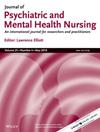Users' Experience of Treatment and Coercion in an Inpatient Medium-Stay Psychiatric Rehabilitation Unit: A Mixed Methods Study
Abstract
Introduction
Coercion influences mental health services users' experience of care and can hinder their recovery process, so it is essential to understand how it is perceived in rehabilitation settings oriented towards recovery.
Aim
To describe and measure users' experience of coercion and explore their perception of the treatment received in an inpatient medium-stay psychiatric rehabilitation unit (IMSPRU).
Method
This study, in which 75 service users participated, used a mixed methods approach. Twenty participants were administered a semistructured interview and completed quantitative measures for coercion and 55 additional service users completed the quantitative measurements only. The perception of coercion was measured using the Coercion Experience Scale.
Results
The content analysis of qualitative data resulted in two main themes: treatment received and experience of coercion in the IMSPRU. The participants made a distinction between good treatment and mistreatment or unfair treatment. Experience of coercion in the IMSPRU included the feeling of freedom or lack thereof in the unit, forms of formal and informal coercion, and the positive or negative impact of rules on the unit. The quantitative data revealed a low perception of formal coercion among the users.
Discussion
Individuals had different views of what it meant to be treated well, but all agreed on the importance of communication and the need to feel respected. Informal coercion was the most frequent type of coercion identified, but users were often unaware of its existence.
Implications for Practice
Knowledge of how IMSPRU users experience the treatment received from nursing staff and how they perceive coercive situations will help to lay the foundations of a system of care oriented towards good treatment and noncoercive practices.

 求助内容:
求助内容: 应助结果提醒方式:
应助结果提醒方式:


